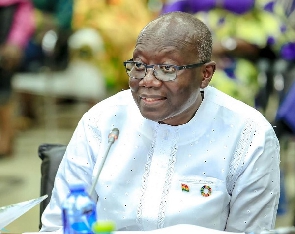 Finance Minister, Ken Ofori-Atta
Finance Minister, Ken Ofori-Atta
Finance Minister, Ken Ofori-Atta, on April 20, 2021 stated that it may take up to three years for the local economy to recover from the shocks of the global pandemic - coronavirus.
He called on the World Bank and the International Monetary Fund (IMF) to come to their aid.
“A U-shaped recovery is touted, but ours will likely be a steep drop, then a two- to three-year downward slide before a recovery; a trapezoid-shaped recovery!,” Mr. Ofori-Atta said in an article published in the Financial Times.
Read the full story originally published on April 21, 2020 by business24online.
It may take up to three years for the economy to recover from the impact of the coronavirus (COVID-19) pandemic, Finance Minister, Ken Ofori-Atta has said, urging that debt aid by lenders such as the World Bank and International Monetary Fund (IMF) is imperative for any recovery programme.
“A U-shaped recovery is touted, but ours will likely be a steep drop, then a two- to three-year downward slide before a recovery; a trapezoid-shaped recovery!,” Mr. Ofori-Atta said in an article published in the Financial Times.
The Finance Minister’s recovery timeframe follows a similar projection by Osei Kyei-Mensah-Bonsu, Majority Leader in Ghana’s 275-member legislature, that the impact of COVID-19 on the economy “will take about two years to address.”
Loss of domestic tax revenue and eroding of macroeconomic gains made over the past three years, following the worldwide spread of COVID-19, has left Ghana, as well as many African economies, in a precarious situation.
Many countries on the continent have depleted their reserves and turned to the Bretton Woods institutions for financial support to contain and fight the respiratory illness.
The IMF last week approved a US$1 billion emergency loan, the highest granted to an African country so far, to aid Ghana fight the effects of the pandemic.
Despite this, the country’s debt level further threatens an already fragile socio-economic situation. Mr. Ofori-Atta notes that though government has lost more than US$1 billion in revenue since the outbreak, it still has an obligation to service its debts.
Former British Prime Minister Gordon Brown has backed the call for debt relief as it is the “most effective pandemic aid.” He has advocated for a waiving of upcoming debt payments by the 76 low- and lower-middle-income countries.
“It would be a tragedy and a travesty if stepped-up global financial support for developing countries ended up helping those countries’ creditors rather than their citizens. National debts incurred before the crisis must be at the top of the international financial agenda. We should agree now that once we have clarity on the economic fallout of the crisis, we will pursue the kind of systemic approach required to restore debt sustainability in a number of emerging-market and developing countries, while safeguarding their prospects for attracting new investment.”
Mr. Brown, writing in an article co-authored with Prof. Lawrence H. Summers, a former President of Harvard University, and published by this newspaper’s partner, Project Syndicate, said: “The current proposal is that creditor countries would offer a six- or nine-month standstill on bilateral debt repayment, at a cost of US$9-13 billion.
But this proposal is constricted both in its time frame and the range of creditors included. We propose relieving over US$35 billion due to official bilateral creditors over this year and next because the crisis will not be resolved in six months and governments need to be able to plan their spending with some certainty.”
View his Timepath;